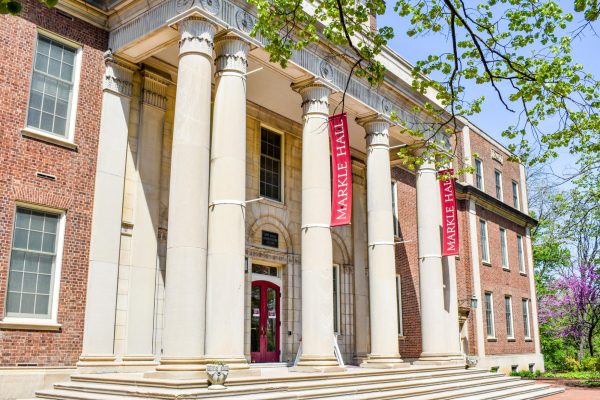Many high school students value college acceptance rates during the application process, hoping it will lead to a favorable postgraduate trajectory. But how much do acceptance rates actually matter?
According to the Common App Research Brief, the number of college applicants in the 2023-24 application cycle has increased by 41% since 2019-20. With more students than ever vying for a spot at elite institutions, the chances of acceptance have reached an all-time low.
Lafayette College’s acceptance rate for the incoming class of 2028 was 31.4%, according to a campus-wide email from college President Nicole Hurd. That number has fluctuated from 28% to 41% over the past ten years, according to college data.
However, students and employers argued that acceptance rates matter much less than high school applicants may think.
Jaylene Martinez ’26 said that she looked at the acceptance rates for Lafayette College when she first applied. However, she feels the breakdown of how often people from various socioeconomic and geographical statuses get accepted to Lafayette matters more to her.
“The acceptance rate is one thing, but seeing the actual breakdown of who was getting accepted matters more than that,” she said.
“Acceptance rates do not have any correlation to the quality of a school,” Zach Kline ‘26 said. “I didn’t choose to become a Lafayette student because of the acceptance rate, I’m at Lafayette because it’s the school that could best improve and showcase my skills and talents.”
Madden Murray ’28 did not consider the acceptance rate a factor in her desire to attend Lafayette.
“It was the only really school that I toured that I loved the campus and saw myself here and it was a really good school,” she said.
In fact, Murray was hesitant to apply based on the school’s acceptance rate.
“I was worried about it, so I did ED2,” she said. More students tend to get into Lafayette in the early decision application cycle, according to the college.
According to employers, the selectivity of a college may have little to no impact on how a candidate’s application is viewed.
Randolph Voorhies, the chief technology officer of inVia Robotics, finds that it has not been a deciding factor yet.
“I suppose ‘all else being equal’ – but things never are, and the prestige of a candidate’s degree is one of the last things I would worry about when evaluating them,” Voorhies wrote in an email.
Employers have varying priorities when it comes to hiring straight out of college. According to Jane Gross, vice president of marketing and on-air promotion at Reelz Channel, the prestige and selectivity of a college play no role in her hiring of potential candidates.
“I look for completion of a four-year degree, major studied, and most importantly participation in extracurricular activities,” Gross wrote in an email. “It’s more about the candidate themselves…always!”
Approximately 37.9% of Americans have obtained a bachelor’s degree, according to a report by the Census Bureau. For some employers – like Meirav Eisenberg, director of operations at iPermit – earning a college degree in itself is an impressive and sought after achievement.

“School is not easy to maintain,” Eisenberg said in an April interview. “For me, as long as you are able to proceed and complete something, that goes a long way. Just to complete something is a big deal.”
Graduates often need to differentiate themselves from similar candidates to have the best chance at landing the job, while also being comfortable working from the ground up.
“I have interviewed too many recent graduates or soon-to-be graduates who have wanted to start out at a higher level than they were qualified for, simply because they completed a four year degree,” Gross wrote.
Other highly desired qualities for recent graduates are strong communication and teamwork skills.
“Communication skills are the highest priority for me when I am hiring a candidate out of college,” Gross wrote. “I want to make sure they are comfortable having conversations and communicating in-person.”
“We want to look for students who can articulate their thoughts clearly,” Eisenberg said. “Whether it’s through written communication, verbal communication or presentation.”
Gross and Voorhies agree that having job experience in either a related or unrelated field makes a larger impact on an application than the selectivity of a college, and that the ability to work in a social environment is crucial to finding success in any position.
“These kinds of things are rarely stressed in standard college courses, and yet are typically the hardest parts of joining a team,” Voorhies said.



























































































































